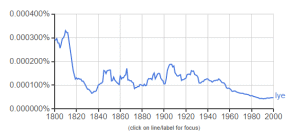Lye is a harsh chemical used in making soap or washing solutions. The term was vastly more common in the 1800s (see ngram below) because people made their own lye at home. The process includes soaking hardwood ashes for days in water. The water becomes lye, which was then used to make soap. When it became more cost-effective to buy bars of soap in a store, the use of the word lye decreased.
Unfortunately, a common way to hear the word lye is in relation to a crime where someone has used the caustic chemical to harm someone else.
Its homonym lie means to tell a falsehood or recline, among other definitions.
The grammatical difference between lie and lay is discussed here.
Examples
Demonstrations will include hearth cooking, apple butter making, sorghum syrup making, blacksmithing, lye soap making, food preservation, and chair bottoming. [Knoxville Daily Sun]
When police arrived at the home on Sept. 7, the lye had turned the man’s eye white and made some of his hair fall out, according to charging documents. [ABC News]
Alkaline hydrolysis uses lye, 300°C heat and huge amounts of pressure to destroy bodies in big stainless-steel cylinders that look similar to pressure cookers. [Daily Mail]
A little lie and a lot of ibuprofen is all a contagious Ebola patient would need to sneak out of Africa and into the United States, a public health watchdog warns. [Daily Mail]
A wretched, ragtag bunch, some still in their pyjamas, others already bloody and beaten in dirty sandals, were then frogmarched into the admissions area and ordered to lie down on the trolleys, ready to be wheeled into the theatres. [Illawarra Mercury]
